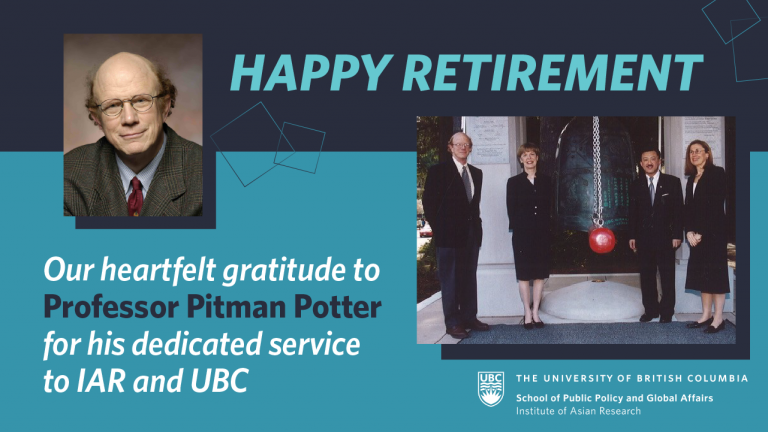From: Timothy Cheek, Director, Institute of Asian Research, SPPGA, UBC, July 1, 2020
Professor Pitman Potter retires today, after 30 years at UBC. Appointed in the Allard School of Law, Professor Potter spent a significant portion of his career at UBC as the Director of the Institute of Asian Research (IAR). While it is not possible during the pandemic to gather together to salute Pitman and to celebrate his contribu-tions to the Institute, I take this opportunity to note some of his singular accomplishments and to share the reflections of some of his colleagues from the IAR. We look forward to a time when we can more fully share our appreciation for his many contributions.
With degrees from The George Washington University and the University of Washington and professional practice as an attorney in both Beijing and San Francisco, Professor Potter came to UBC in 1990. He was active in the Law School, directing the Chinese Legal Studies program and then the Centre for Asian Legal Studies. Throughout his career Professor Potter was an exemplary scholar of Chinese law and politics. He secured not one but two Major Collaborative Research Initiative (MCRI) grants for his “Asia Pacific Dispute Resolution Program: Understanding Integrated Compliance with International Trade and Human Rights Standards in Comparative Perspective”. These grants are the largest multi-intuitional, multi-year grants offered in Canada by the Social Sciences and Humanities Research Council. For a total of ten years of international collaboration and nearly a dozen book-length publications and reports, Professor Potter’s grants brought international recognition to UBC and resources to the Institute of Asian Research that greatly expanded our policy relevant research on Asia.


Professor Potter’s considerable research achievements were summarized in the citation at his appointment as Fellow in the Royal Society of Canada in 2015: “Potter is an internationally acclaimed scholar with significant impact on legal scholarship and policy around the world. His insightful studies of China’s legal systems and the innovative methodologies and paradigms he developed have reshaped the study of legal systems in emerging and transitioning economies. His pioneering work on the concept of coordinated compliance presented an important conceptual breakthrough introducing a bold new approach toward integrating human rights and trade policy.”


Pitman has given us a model of a well-rounded public life. His abiding concern for the normative and moral characterized his administrative leadership as well as his scholarly writings. In mid-life he completed a Masters of Divinity and is an ordained Deacon in the Anglican Church. He regularly shares his love of music—famously among friends and colleagues with his Grateful Dead cover band—and continues to write and record music in the folk tradition. Many have shared his love of nature and long rambles on Galiano Island and around BC.


Paul Evans (Director of the IAR, 2009-12) remembers Pitman as “an intellectual dynamo in his own right and a larger than life figure in Chinese studies, he was a formidable presence and leader as the director of the Institute in its golden era of growth. Among other contributions, the design and launch of the MAPPS program under his leadership was a major achievement in inter-disciplinary innovation marrying place-based knowledge to the world of contemporary policy.”
Julian Dierkes (Keidanren Chair in Japanese Research, Associate Director, IAR, 2009-12) recalls in particular “Pitman’s support for my then-budding Mongolia interest. In 2005, I travelled to China with Pitman and then to Hohhot for a visit to Inner Mongolian University. I had not had much experience being confronted by aspects of China’s insidious minority policy and had not fully embraced my “Inner Mongolian” myself, but soaked up watching Pitman interact with academics (Mongolian and Han) and keeping calm in the face of some blatant bending of various truths. So many questions that Pitman raised on that trip stayed with me as I began to ask questions about Mongolia. Pitman not only shaped those questions through his model, but allowed me the intellectual space and the institutional support to explore them.”
Alison Bailey (Director of the Centre for Chinese Research, 2004-11) says, “I have known Pitman Potter, a dear friend and colleague, since 2003, and have worked with him on many projects and events. I have enormous respect for Pitman’s fierce intellectual spirit and deep integrity – his courage and forthrightness in speaking truth to power have earned him a few enemies but many more friends. In addition to his formidable academic contributions he has been tireless working with his wife Vicki to help ease the plight of the homeless in Vancouver and never ceases to remind us of the necessity to uphold human rights and remember those who have suffered oppression. A widely-read scholar, confident and eloquent in speech and writing, he also disarms with his sudden crack of laughter at himself. A man of many parts.”
Yves Tiberghien (Director of the IAR, 2012-17) notes: “In every part of his work at UBC, Pitman has excelled and transformed everyone around him. He is driven by both passion for the subject matter and his sense of mission to make things better, first by deeply analyzing China’s legal processes and working on links with the rest of the world, and second in denouncing the authoritarian turn in the Chinese governance pathway. He is a tireless worker and a dedicated friend. He has been an extraordinary mentor to dozens of graduate students over decades.”





